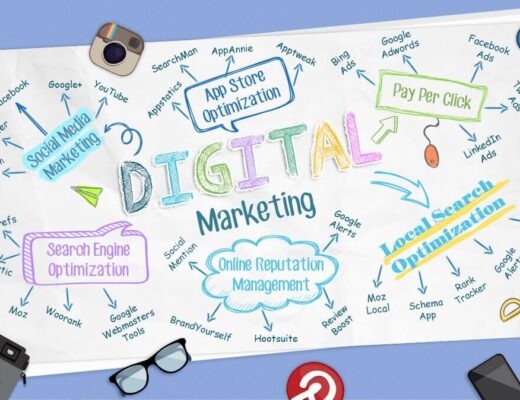Online advertising has undergone a massive transformation over the past decade. In 2024, the digital marketing landscape looks very different than it did even just a few years ago.
As consumer behaviour and technology continue to evolve rapidly, marketers must adapt their strategies to keep up.
While some may wonder if online advertising is “dead” in its traditional sense, it has simply taken new shapes and forms.
Partnering with an experienced digital marketing company is key to navigating this changed landscape and connecting with today’s consumers.
The Decline of Traditional Online Advertising
It’s true that some traditional online ad formats like banner ads and pre-roll video ads are declining in effectiveness.
Consumers have grown immune to these interruptive forms of advertising that dominated the early years of the internet.
Ad blocker usage is on the rise, and people are increasingly likely to ignore or avoid ads that aren’t relevant or tailored specifically to them. The digital marketing company knows this shift intimately.
Display advertising click-through rates have steadily dropped to abysmal levels. Facebook recently reported click-through rates of under 0.5% for most ad units.
At the same time, platforms are now saturated with marketers trying to reach consumers, making it harder than ever to cut through the noise. Simply stacking more display ads will do little to move the needle today.
The Rise of Targeted, Personalized Advertising
While traditional online advertising flounders, data-driven, personalized advertising thrives.
Particularly on platforms like Facebook and Instagram, marketers can drill down to precisely target specific demographics, interests, behaviors and more.
Advanced tracking and pixels allow for detailed attribution modeling and optimization. Digital marketing companies leverage these capabilities to drive conversions and ROI efficiently.
Instead of wasting spend on big untargeted audiences, marketers reallocate dollars towards targeted ads that convert.
Context also matters – by aligning ads with appropriate content which the target audience engages with, relevance and performance improves. For example, fitness ads reach the right customers on health and wellness sites related to their interests.
Influencers Continue to Gain Traction
Influencers and content creators on platforms like Instagram and TikTok have become a major advertising channel. Partnering with influencers allows brands to tap into their loyal, engaged communities and get authentic recommendations.
The growth of the creator economy has given influencer marketing a new level of sophistication.
A leading digital marketing company represent top influencers and help broker deals with big brands. Data is leveraged to identify not only the overall best influencers, but which ones specifically index highest for each brand’s target audience.
With consumers increasingly seeking recommendations from influencers over traditional ads, smart digital marketing companies have invested heavily in this space.
The Intersection of Digital and Traditional Advertising
As digital and traditional advertising channels converge, integration is key for branding and customer journey impact. Although TV still garners the largest portion of ad budgets, the big screen is no longer isolated. Digital channels now allow brands to extend storytelling, drive deeper engagement and attribution.
For example, QR codes on TV, billboards and more create seamless links to online destinations. Ad retargeting means brands can follow up on TV campaigns with related display ads, stories, offers and more via connected devices. The consumer sees one consistent, omnichannel narrative.
Agencies adept in orchestrating this synergy between traditional and digital achieve much greater campaign results than viewing channels in isolation.
The Importance of Owned Media and Analytics
While paid advertising remains important, truly data-driven marketers have invested more heavily in owned media. Brand websites, blogs, nurture emails, product listings, etc. allow for direct, uninterrupted visibility and engagement.
Designing the user journey through high-intent owned assets gives brands much more control than third-party channels. Sophisticated marketing automation and CRM platforms provide a unified view of each customer and their path.
With cookies going away and external platforms tightening data access, owned channels become even more critical. Smart digital marketing companies drive the importance of owned media and help implement technology to optimize it.
The Rise of Automation
Sophisticated automation now powers the digital marketing ecosystem. Machine learning algorithms help determine optimal targeting, bids, budgets, creative and more. Rules-based workflows trigger tailored messaging automatically to customers based on signals.
Automation increases efficiency, reduces human errors and drives significantly higher performance. MARKETING platforms provide a user-friendly framework to configure and deploy automation. This eliminates need for constant manual oversight.
The highest ROI today comes from marketers pairing human creativity and intuition with automated optimization and intelligence. Digital marketing companies at the forefront leverage automation while still focusing on strategy, ideation and innovation.
Why Partnering with a Digital Marketing Company is Critical
With the digital landscape evolving faster than ever, most companies struggle to keep up. There are too many moving parts across too many complex, interconnected channels. Having an in-house team try to master it all is challenging if not impossible.
This is why partnering with an experienced digital marketing company is now considered essential. Agencies focused purely on results for clients provide an array of expertise not feasible internally.
Some of the key benefits include:
- Access to top-tier talent across specialties like Paid Search, SEO, Paid Social, Email Marketing, Attribution Modelling, Web Design and more. Effective holistic strategies require expertise across disciplines.
- An outside, objective perspective. Agencies provide strategic consulting based on what will actually work best, not internal politics or preferences.
- Efficiency through proven processes, workflows and automation platforms. Agencies have optimized ways of working honed across many clients.
- Exposure to latest technologies, capabilities and best practices happening across the industry. Agencies invest heavily in staying ahead of trends.
- Deep vertical expertise within specific industries. Agencies focus on mastering the nuances of your particular business models and audiences.




